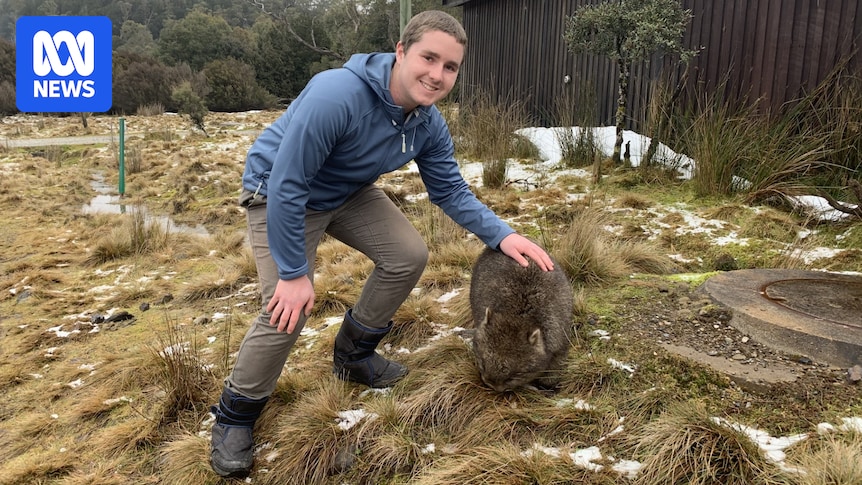Tom French went from being a teenager who loved the outdoors to a young adult who could not leave the house.
Crippling anxiety and agoraphobia led to an autism diagnosis later in his adolescence.
“He just cut himself off from the world,” Mr French’s mum, Fiona Archer, said.
“It’s been really hard to watch the decline. I’m getting emotional now.”
Tom French and his mother Fiona Archer at home at Turners Beach, near Devonport. (ABC News: Mackenzie Archer)
Mr French was referred to the Youth Mental Health Hospital in the Home (HiTH) program after years of not being able to access proper treatment due to his fear of leaving the home.
The program aims to help youth in Tasmania’s north-west with complex and acute mental health concerns and, for the last five weeks, Tom has received in-home care from a range of mental health professionals.
In-home care boosting confidence
Ms Archer said Tom’s favourite place in the world was Cradle Mountain and that many of his happiest childhood and adolescent memories took place there.
“He was a real nature lover, he loved being outdoors,” Ms Archer said.
Tom French at Cradle Mountain around 2019. (Supplied: Fiona Archer)
“It’s just been really hard to see someone who was always willing to be out and about and doing different things to just wanting to be on his own.”
Ms Archer described HiTH as a “glimmer of hope” at a time when she no longer knew how to help her son.
“He couldn’t leave the house, so that was the whole issue,” she said.
“That’s what’s been the beauty of Hospital in the Home, that they’ve actually been able to come here.”
Tom French and sister Meg, with their mother Fiona Archer. (ABC News: Mackenzie Archer)
Mr French said just before starting HiTH, he had hit breaking point.
“I was stuck,” he said.
“I was not living, and I knew I wanted to start living my life again.”
Prior to accessing HITH, Mr French was unable receive care due to his agoraphobia. (ABC News: Mackenzie Archer)
Now, he has gone from locking himself in his room when the program staff arrived, to greeting them at the door.
“It was uncomfortable at the start, but once I’ve got to know them, I’ve opened up more,” he said.
“It has made me push myself and start trying new things. Start doing the things I used to do.”
Senior social worker Simon O’Kane and youth peer worker Hanna Blackburn meet with Mr French (centre). (ABC News: Mackenzie Archer)
Delivering outcomes for the community
HiTH is staffed by a multi-disciplinary team of mental health professionals, including psychiatrists, general practitioners, pharmacists, registered nurses, mental health nurses, social workers, allied health staff, youth workers, and people with lived experience.
Since launching mid last year, the service has gone from operating three beds, five days a week to now operating 12 beds, seven days a week.
These kids fought back against a national health crisis — and won
Child and Youth Mental Health Service (CYMHS) North West team leader Dion Butler said there was an increasing need for youth mental health services in the region.
“There isn’t a dedicated hospital mental health ward for young people, it’s either the adult ward or the paediatric ward and these are often not appropriate to cater to the developmental needs of this age group,” Mr Butler said.
Child and Youth Mental Health Service north-west team leader Dion Butler and HITH nurse unit manager Susan Smith in Devonport. (ABC News: Mackenzie Archer)
He said the program had treated youth with a range of mental health concerns including severe anxiety and depression, first-episode psychosis, schizophrenia, bipolar, borderline personality disorder and eating disorders.
Clinical staff conduct full health assessments and develop tailored treatment plans for the patients in the program.
This includes doing baseline observations, mental health screening, assessing physical health, nutrition, diet, drug and alcohol use, and medication prescriptions.
Tom French’s Hospital in the Home care plan. (ABC News: Mackenzie Archer)
Mr Butler said the program also considered the psychosocial aspect of recovery.
“Recovery for young people happens in a broader framework outside the standard medical model,” he said.
“Our youth workers have helped some of our young people with resumes, job coaching, and getting back to school.”
Holistic approach to mental health
HiTH senior social worker Simon O’Kane said the program was making a real impact on all levels.
“It’s intensive, which is necessary,” Mr O’Kane said.
Mr O’Kane said the program also treated the social symptoms from illnesses. (ABC News: Mackenzie Archer)
“We do twice daily visits [and] we’re available for the really intensive support early on — which makes a big difference in terms of the outcome.
“We’re not just treating an illness, we’re treating the symptoms and all the kind of social deficits around the illness as well, which I feel is different from other services,” he said.
Mental Health Council of Tasmania CEO Dan Vautin said research showed that health outcomes were better when people could receive care in their own environment.
Dan Vautin, Mental Health Council of Tasmania CEO. (Facebook: Mental Health Council of Tasmania)
“No-one wants to end up in hospital if they don’t have to,” Mr Vautin said.
But … for young Tasmanians experiencing mental health challenges, a hospital is often not the best environment for their care and recovery.”
Tasmania’s only large-scale private mental health clinic to close
The program is calling on the Tasmanian government to secure funding beyond 2026.
And with the potential closure of Hobart’s last private mental health clinic, the Hobart Clinic, HiTH hopes to expand to other regions of Tasmania to support a growing number of young adults with complex mental health concerns.
Loading…

